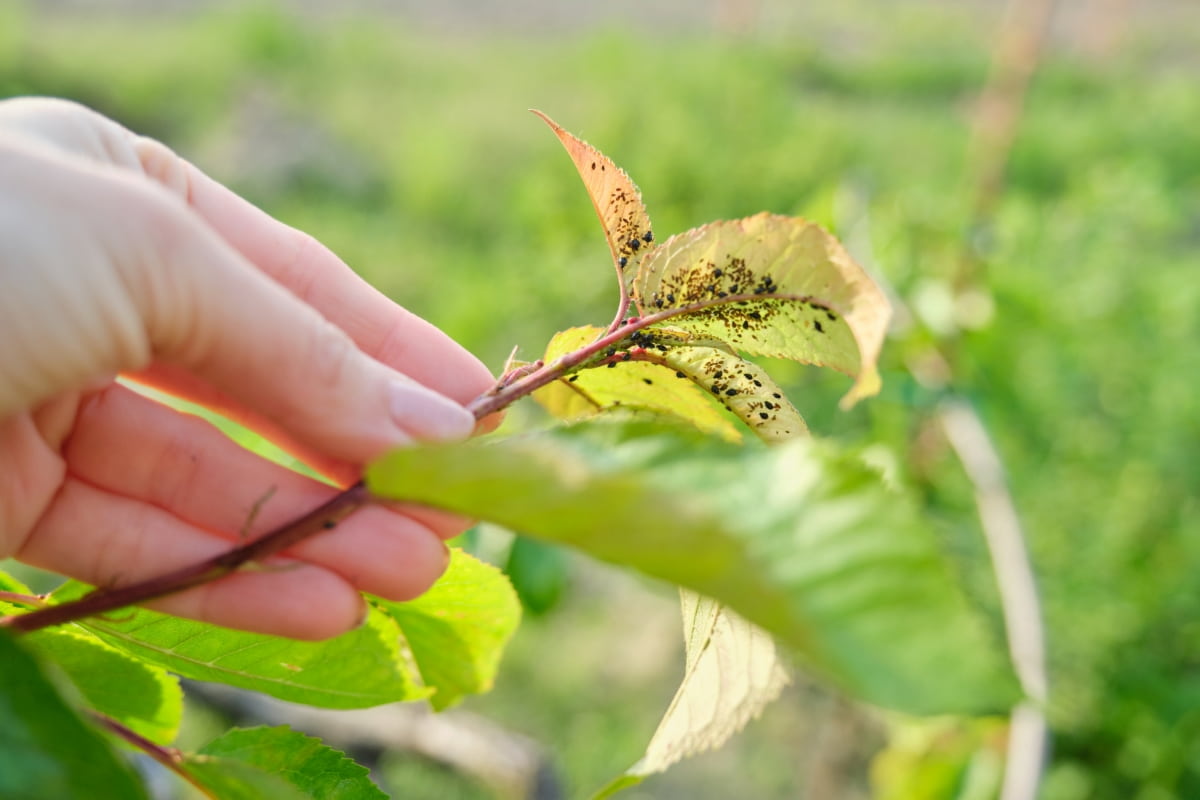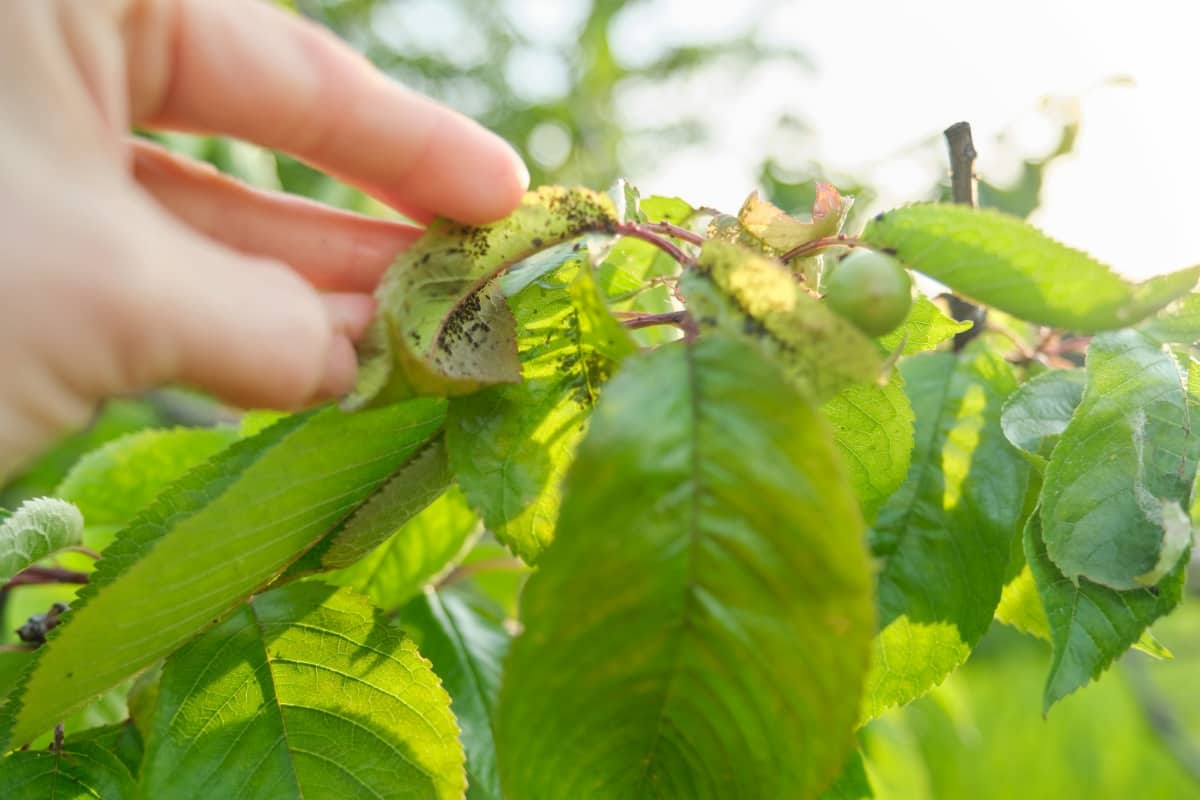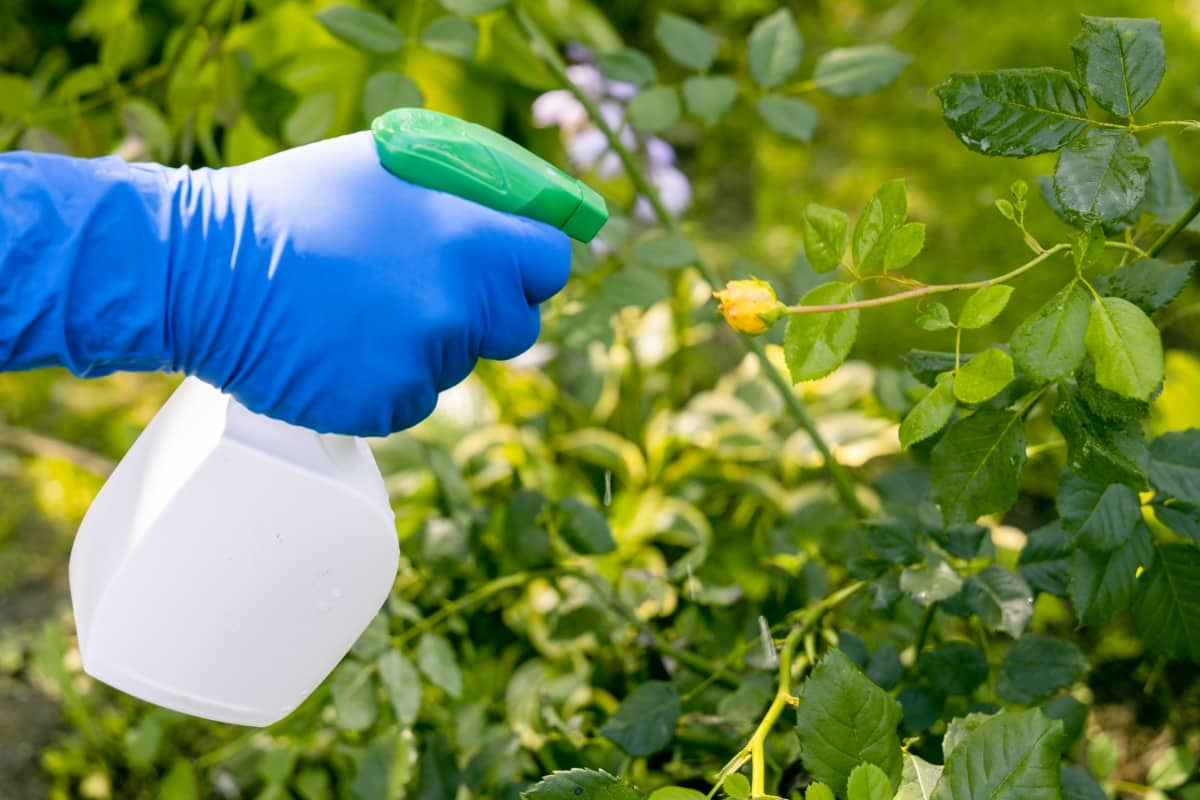Aphids are tiny insects that belong to the superfamily Aphidoidea, which includes over 4,000 species. They are common pests and can quickly damage garden plants. This can cause leaves to turn yellow, curl, and drop off.

How to Control and Eradicate Aphids
Effective Home Remedies for Aphid Infestations
- Home remedies are a cost-effective and natural way to control aphids in your garden. The simplest home remedy is to blast aphids off garden plants with water from a hose. This dislodges them from the leaves, stems, and flowers without harming the plant.
- Another effective method is using homemade insecticidal soap by mixing about 1 tablespoon of dish soap with one quart of water in a bottle. The soap suffocates the aphids by clogging their breathing pores.
- Garlic spray is also an excellent home remedy for controlling aphids.
- If you have access to essential oils such as peppermint, clove, or rosemary, mix 10-15 drops of these oils with water and spray on the affected areas of your plant. These natural oils will help repel aphids while providing a pleasant scent.
- You could also introduce companion planting into your garden, where certain plants attract beneficial insects like ladybugs that prey on aphid populations. Plants such as marigolds, sunflowers, and daisies are great options.
Natural Ways to Control Aphids in Gardens
- One option is to remove aphids by hand, spraying them off with a hose or knocking them into a bucket of soapy water. This can be tedious work but can significantly reduce their population.
- Another organic solution is to use a neem oil spray on your plants. Mix neem oil carefully with water and spray it directly onto the affected areas. These solutions work by suffocating the insects and disrupting their feeding habits.
- Employing natural predators like ladybugs, green lacewings, and birds can also help keep aphid populations under control. You can effectively manage an aphid infestation without harming beneficial insects or contaminating your plants with harmful chemicals.
Organic Methods to Eradicate Aphids on Plants
- Organic methods to eradicate aphids on plants can effectively control infestations without harming the environment or beneficial insects. One of the most popular organic solutions is using a soap-and-water mixture. The soap interferes with the aphid’s breathing ability and eventually leads to their demise.
- Another organic solution is neem oil, derived from a tropical tree’s seeds. Neem oil disrupts an insect’s growth hormones, preventing them from maturing and reproducing.
- Essential oils such as peppermint, garlic, or clove have also been shown to repel or kill aphids when applied directly onto infested plants. Introducing natural predators like ladybugs and green lacewings into your garden can also help control aphid populations.
Best Insecticides for Aphid Control in Vegetable Gardens
- One of the best options for aphid control is neem oil. It acts as a natural repellent for aphids and disrupts their feeding patterns, leading to eventual death. It’s important to note that neem oil should only be applied during cooler temperatures, not during hot weather or direct sunlight.
- Another option is insecticidal soap, which suffocates the aphids through its fatty acid content. This insecticide is safe for humans and pets but may harm some plants if applied too frequently.
- Pyrethrin-based insecticides are another effective choice for controlling aphids in vegetable gardens.
- It’s crucial to read labels carefully when choosing an insecticide for your garden and always follow application instructions closely. Additionally, consider using non-toxic methods such as handpicking or introducing beneficial insects like ladybugs before using chemical treatments.
In case you missed it: Breathing Fresh: Top 10 Indoor Plants for Air Purification

How to Prevent Aphid Damage in Flowers?
- Preventing aphid damage in flowers is essential to ensure healthy and beautiful blooms. The main step is to keep your garden clean and tidy by removing dead leaves, weeds, or debris that may attract aphids. Avoid over-fertilizing your garden plants, as this can also attract pests.
- Another effective way to prevent aphids from damaging your flowers is by introducing companion plants such as marigolds, chives, or garlic around the affected areas. These plants have natural insect-repellent properties that help deter aphids.
- You can also use physical barriers like mesh netting or row covers to protect your flowers from aphid infestations. This will prevent them from entering and keep other insects away.
- Regularly inspecting your plants for signs of an infestation is crucial in preventing further damage. Early detection allows you to treat the infection quickly before it gets out of hand.
Managing Aphids on Fruit Trees: Tips and Tricks
- Aphids can be a nuisance for fruit tree growers, as they suck the sap of the plant and transmit viruses that can harm your trees. You should monitor your fruit trees regularly for any signs of aphids. Early detection is key in preventing an infestation from becoming severe. Look for curled leaves or honeydew on foliage, indicating aphids’ presence.
- Next, it’s essential to maintain good hygiene practices around your fruit trees by removing fallen leaves and debris that may harbor overwintering eggs or nymphs. It would help if you also pruned away dead or damaged branches, as these can serve as entry points for pests.
- Another effective way to control aphids on fruit trees is through natural predators like ladybugs and lacewings. These beneficial insects help keep the population of aphids in check by feeding on them.
Integrated Pest Management for Aphid Eradication
Integrated Pest Management (IPM) is an environmentally friendly pest control approach involving a combination of prevention, monitoring, and control methods. IPM can be an effective strategy for both small gardens and larger agricultural operations. Prevention is the first step in IPM for aphids.
This includes selecting resistant plant varieties, rotating crops, and maintaining healthy soil through proper fertilization and irrigation. Monitoring for early signs of aphid infestation is also crucial in IPM. Regularly inspecting plants for symptoms like curled leaves or sticky residue can help identify a problem before it becomes too severe.
Using Beneficial Insects to Combat Aphids
- The effective way to control aphids is by using beneficial insects that prey on them. These insects are natural predators and will help keep the aphid population under control without harming your plants.
- Ladybugs, or lady beetles, are among the most well-known beneficial insects for controlling aphids. They feed on large numbers of aphids. Attract ladybugs to your garden by growing flowers such as dill and fennel, which they love.
- Green lacewings are another beneficial insect that feeds on aphids. Their larvae are voracious eaters, consuming up to 200 aphids in their first week alone. Green lacewings can be attracted to your garden with a variety of flowers, such as yarrow and chamomile.
- Using beneficial insects is an environmentally friendly way to manage pest problems in your garden while maintaining a healthy ecosystem.
Chemical-Free Solutions for Aphid Control
- Numerous natural and organic remedies are available for controlling aphids in your garden or indoor plants. From soapy water solutions to beneficial predator insects like ladybugs and green lacewings, a wide range of non-toxic methods can help keep those pesky bugs at bay.
- Prevention of aphids is key when it comes to managing. Ensure your plants have proper growing conditions, such as adequate sunlight and moisture. Regularly inspect your garden plants for early signs of an infestation, such as wilting leaves or deformed growth patterns.
In case you missed it: How to Grow and Care for Spaghetti Squash: A Comprehensive Guide

Conclusion
Aphids feed on plants, sucking the sap out of them. This can cause leaves to turn yellow, droop, and become distorted. Aphids can also spread viruses. Aphids are found in many plants but are most common in warm climates. Despite their small size, aphids can cause significant damage to plants.
- Feed Your Flock for Less: Top 10 Tips to Save on Chicken Feed
- Ultimate Guide to Ossabaw Island Hog: Breeding, Raising, Diet, and Care
- Hatching Answers: The Top 10 Reasons Your Chickens Aren’t Laying Eggs
- Eggs and Economics: Breaking Down the Cost of Raising Backyard Chickens
- Defend Your Greens: Proven Methods to Keep Iguanas Out of Your Garden
- Ultimate Guide to Cinnamon Queen Chicken: A Comprehensive Guide for Beginners
- Ultimate Guide to California Tan Chicken: Breeding, Raising, Diet, Egg-Production and Care
- Ultimate Guide to Marsh Daisy Chicken: Breeding, Raising, Diet, and Care
- 10 Types of Chicken Farming Businesses You Can Start for Profits